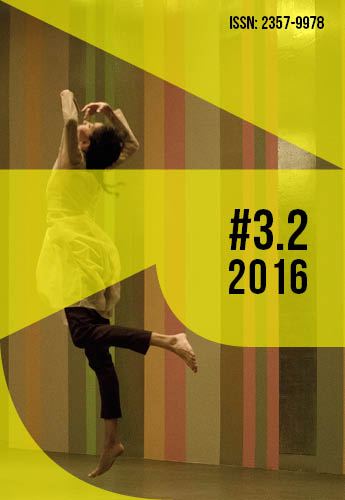EROS VOLÚSIA Performance, poéticas criativas e afirmação identitária
DOI:
https://doi.org/10.36025/arj.v3i2.9040Palavras-chave:
Dança, Poética, Performance, Identidade, Indústria Cultural.Resumo
A partir dos anos 1940, o Rio de Janeiro, a Capital Federal, centro de poder, começa a produzir e projetar para o Brasil uma imagem do "carioca" que agrega tanto a ideia de ser integrante do rol das nações civilizadas pretendida pelas elites, como também portadora de uma malemolência, musicalidade e humor peculiares, trazidos pelo movimento cultural popular e negro. Já sob a influência da Segunda Guerra Mundial, estreitam-se relações entre os governos americano e ditaduras latino-americanas, a chamada política de boa vizinhança. Neste contexto cultural, Eros Volúsia desponta em performance exuberante como bailarina, professora e criadora da Dança Brasileira, uma realidade múltipla e contraditória entre a tradição e o popular. Mais que uma garota propaganda Eros explode a cena com uma poética criativa, sendo mais e além.
Downloads
Referências
ANDRADE, Mário de. Danças dramáticas do Brasil. Belo Horizonte/Brasília: Itatiaia, Instituto Nacional do Livro, Fund. Nacional Pró Memória, 1992.
BACHELARD, G. A Poética do Espaço. São Paulo: Martins Fontes, 2008.
LIMA, Nelson. A dança de Eros Volúsia. In: Entre Europa e África: a invenção do carioca. Rio de Janeiro: Topbooks, 2000.
MOTA, Carlos Guilherme. Ideologia da Cultura Brasileira (1933-1974). São Paulo: Ática, 1990.
MOURA, Roberto. A indústria cultural e o espetáculo-negócio no Rio de Janeiro. In: Entre Europa e África: a invenção do carioca. Rio de Janeiro: Topsbooks, 2000.
ORTIZ, Renato. Cultura Brasileira & Identidade Nacional. São Paulo: Brasiliense, 2008.
PEREIRA, Roberto. Eros Volusia a criadora do bailado nacional - perfis do Rio. Rio de Janeiro: Relume Dumará, 2004.
SALIBA, Elias Thomé. A dimensão cômica da vida privada na República. In: História da Vida Privada no Brasil. São Paulo: Cia das Letras, 1998.
SEVCENKO, Nicolau. A capital irradiante: técnica, ritmos e ritos do Rio. In: História da Vida Privada no Brasil. São Paulo: Cia das Letras, 1998.
TINHORÃO, José Ramos. Pequena história da música popular. São Paulo: Art Editora, 1998.
VELLOSO, Monica. Que cara tem o Brasil? As maneiras de pensar e sentir o nosso país. Rio de Janeiro: Ediouro, 2000.
VOLÚSIA, Eros. Eu e a dança. Rio de Janeiro: Revista Continente, 1983.
ZENICOLA, Denise. The Slaves In: A Gazelle of the Savannah. Abuja: Alpha Crownes Publishers, 2012.
Downloads
Publicado
Como Citar
Edição
Seção
Licença
Copyright (c) 2016 Denise Mancebo Zenicola (Autor)

Este trabalho está licenciado sob uma licença Creative Commons Attribution-NonCommercial-ShareAlike 4.0 International License.

Esta obra está licenciada com uma Licença Creative Commons Atribuição-NãoComercial-CompartilhaIgual 4.0 Internacional.
Autores detêm os direitos autorais ao licenciar sua produção sob Creative Commons Atribuição-NãoComercial-CompartilhaIgual 4.0 Internacional.


 English
English Português (Brasil)
Português (Brasil)
